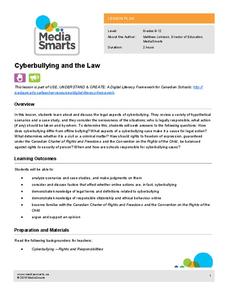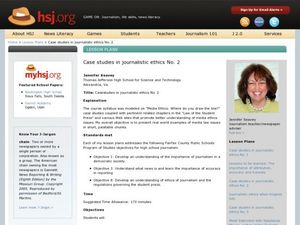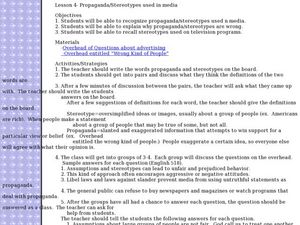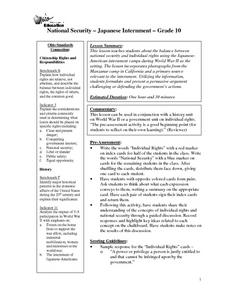Alabama Department of Archives and History
New York Times Co. v Sullivan: The Alabama Case that Changed Libel Law
Malice aforethought? Can the New York Times be held libel for false claims appearing in its ads? The Supreme Court case New York Times v Sullivan changed the interpretation of the First Amendment. Class members examine these changes and...
Curated OER
The First Amendment, What it Means and When Libel Comes in to Play
Students research three topics: The First Amendment, John Peter Zenger and his trial, and libel. In this journalism and libel lesson, students discuss things authority figures have done they disagree with and the anit-sedition law....
Curated OER
Law & Ethics for Photojournalists
Students identify and discuss First Amendment rights, examine how to make sound legal judgements regarding photographs of private individuals, examine difference between public and private figures as far as libel law is concerned,...
Media Smarts
Cyberbullying and the Law
Research, role-playing, and reflection are the three “R’s” that form the basis of an examination of Cyberbullying. Although based on the Criminal Code of Canada, the included scenarios and case studies provide valuable resources for a...
Curated OER
Chaucer's "The Prioress' Tale"
Students examine Anti-Semitism in literature. In this Chaucer lesson, students review the concept of blood libel and then identify and analyze the Anti-Semitic message of "The Prioress' Tale."
Curated OER
What are the benefits of having a Free Press?
Students examine why actual malice is necessary in libel cases. Students demonstrate the importance of a third party in libel and slander cases. They analyze why a free press is essential in American society.
Curated OER
Worksheet #56 Questions - Judicial Terms
In this American judicial terms instructional activity, students examine their knowledge through ten fill in the blank questions that relate to the aforementioned topic.
Curated OER
Students Press Law and Ethics
Students research the rights and the responsibilities of journalists in dealing with First Amendment issues. In this First Amendment lesson plan, students research the Alien and Sedition Acts and study the five elements of libel....
Fluence Learning
Writing an Argument: Free Speech
How do you assess whether pupils have mastered certain concepts and skills? Designing a performance task that asks learners to demonstrate their skills and providing writers with a rubric that identifies these skills and provides...
Social Media Toolbox
Law Review
How can your journalism class ensure they use social media responsibly and legally? The sixth lesson in a 16-part Social Media Toolbox series asks pupils to dig deep into the legal aspects of social media use by school publications....
Cave Creek Unified School District
Crusades and Culture in the Middle Ages
The Crusades sounds like a glamorous time period in the Middle Ages full of glory—but was it? Scholars find and review the truth of the Crusades' influence on the world through the resource. The study guides, separated individually by...
Social Media Toolbox
Cyberbullying
What can we do to make our school community more aware of cyberbullying? From The Social Media Toolbox, lesson 10 of 16 takes on the tough topic of bullying. Learners research cyberbullying through online research, then create an...
Curated OER
Media Arts Production
Students learn about the basic legal and ethical responsibilities shouldered by people making "reality" videos (i.e. videos with non-actors).
Curated OER
Researching American Democracy
Students compare Watergate and the Clinton/Lewinsky scandal. In this U.S. Constitution lesson, students define vocabulary terms and read articles regarding the impeachment process. Students respond to questions that require them to...
Curated OER
Case Studies in Journalistic Ethics No. 2
Learners use texts on media ethics and various Web sites to explore real world examples of media law issues. For this media ethics lesson, young scholars examine the Food Lion case using a transcript from the court of appeals session...
Curated OER
Propaganda/Stereotypes Used in the Media
Learners write a character sketch on a television character who they feel is a stereotype. In this propaganda/stereotype lesson, students discuss the definition of the terms and ways that the media uses both. Learners relate the use of...
Curated OER
The Bill of Rights
Seventh graders determine why the Bill of Rights was added to the Constitution. In this U.S. government lesson, 7th graders discuss the first 10 amendments and any vocabulary they may be unfamiliar with. Students then read different...
Curated OER
Breaking News English: Anti-McDonald's McDavids Beat Goliath
In this English worksheet, students read "Anti-McDonald's McDavids Beat Goliath," and then respond to 8 multiple choice, 27 fill in the blank, 7 short answer, 20 matching, and 8 true or false questions about the selection.
Curated OER
National Security - Japanese Internment
Tenth graders investigate the balance between national security and individual rights using the Japanese American internment camps during World War II as the setting. The lesson plan incorporates photographs from the Manzanar camp in...
Other popular searches
- Libel Issues
- Slander and Libel
- Arnold Libel
- Arnold Libel Mouse Soup
- Libel Scenarios
- Journalism Law Libel
- Cookies by Arnold Libel
- Arnold Libel Literature Unit
- Arnold Libel Fables
- Arnold Libel the Kite
- Slander Snd Libel
- Arnold Libel the Letter




















